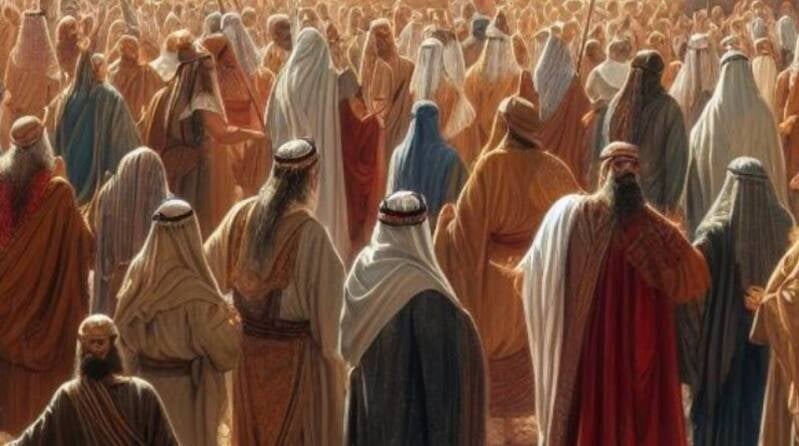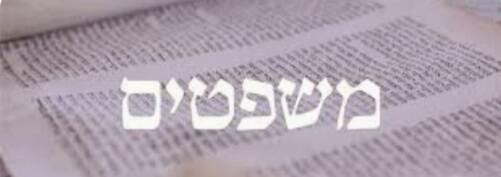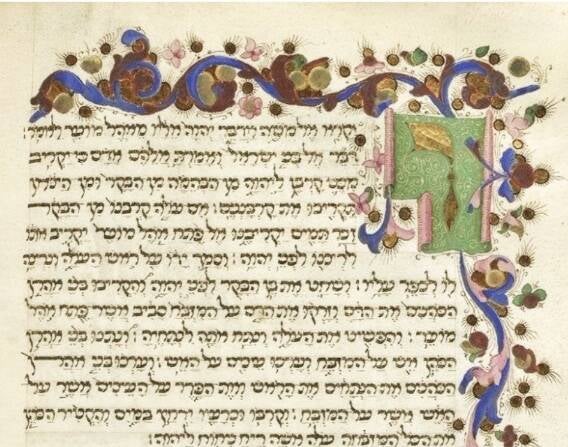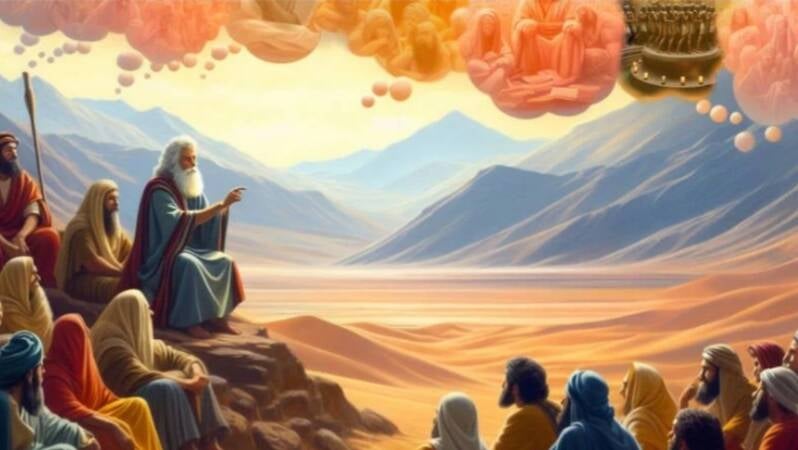We find a beautiful lesson in the Talmud:
Moses’ love for Torah was surpassed only by his love for the Jewish people. His pleas to be allowed into the Land stemmed from his tremendous desire to fulfill the many mitzvahs that may only be performed there. In response, G‑d told Moses that he would be able to fulfill those mitzvahs on a spiritual level.
There are many mitzvahs that a person cannot fulfill because they never encounter the circumstances that allow them to do so. For example, the mitzvah of Levirate marriage: the Torah dictates that if a married man dies childless, the widow is to marry her deceased husband’s brother. Most people will not encounter this scenario, and thus can only fulfill this mitzvah on a spiritual level. Or the mitzvah to leave a forgotten sheaf of wheat for the poor while harvesting a field: one who never forgets a sheaf in the field cannot physically perform this mitzvah.
The very desire to perform a mitzvah that is out of reach because the situation never presents itself earns you a spiritual reward. This is what G‑d said to Moses concerning the mitzvahs of the Land of Israel—spiritually, it would be considered as if he had performed them.
Acting With Alacrity
When Moses realized he would not enter the Land, he rushed to fulfill the mitzvah of establishing three Cities of Refuge outside of Israel.
In Biblical times, three cities in the Land of Israel proper and three cities east of the Jordan—where two and a half tribes lived—were designated as “Cities of Refuge”—where a person who accidentally killed someone could find safe haven from avenging relatives.
Knowing that he would not merit to designate the Cities of Refuge in the Land of Israel, Moses jumped at the opportunity to designate the three cities outside of the Land, despite knowing that they would not actually be activated as Cities of Refuge until the Jewish people entered Israel. Such was his love for mitzvahs and his desire to fulfill as many as possible.
Moses’ approach was, “I will not delay the opportunity to perform a mitzvah. If I have a mitzvah I can fulfill, I will act with alacrity and diligence and fulfill it now.”
This is the idea of zerizut—acting quickly and with alacrity to perform a mitzvah—first learned from our forefather Abraham. When G‑d instructed him regarding the binding of Isaac, “Abraham rose up very early in the morning”7 to fulfill that commandment. This eagerness to carry out G‑d’s command to sacrifice his son, setting aside all personal feelings, is a most remarkable aspect of this story and, consequently, an essential lesson for us all: if we have an opportunity to do a mitzvah today, we should do it today!
Finding Refuge in Torah
The Rebbe taught that the modern-day equivalent of the Cities of Refuge is Torah study. “The study of Torah provides refuge,” promises the Talmud. Where can we run to today when we commit an inadvertent sin? When we find ourselves overwhelmed and beleaguered, wanting to return to G‑d, but feeling that we have lost sight of our priorities and given in to temptation, Torah provides refuge, giving us energy to rejuvenate.
For thousands of years, when faced with trials and tribulations, Jews have turned to books of Torah. This practice gives us strength, vitality, comfort, and protection—the modern-day City of Refuge.
This echoes the famous teaching of the Baal Shem Tov: When the Great Flood began, and the world was about to crumble around him, G‑d instructed Noah, “Enter the ark.”
The Hebrew word for “Ark”—teivah—also means “word.” G‑d was telling Noah—and each of us—to enter into the words of Torah and prayer. Torah is a refuge, a place where we can find security from the floodwaters of life.
Transmitting the Love
Moses also recounts the Ten Commandments in this week’s portion, reminding the Jewish People that they only heard the first two commandments directly from G‑d. So frightened and overwhelmed were they by the intense holiness, that Moses stepped in and conveyed the final eight: “I stood as an intermediary between G‑d and you at that time in order to tell you the word of G‑d regarding the last eight commandments…”
Seemingly, the word “intermediary” is troublesome: Does it not imply that Moses is—G‑d forbid—taking G‑d’s place?
Chassidic teachings clarify that there are two types of intermediaries. The first is an “intermediary that divides,” the one that says, “If you want to communicate with G‑d, you have to go through me first.” This is not good; this is unholy and not Jewish. A Jew can and should communicate with G‑d directly.
The second type of intermediary, however, the type Moses is talking about, is an “intermediary that connects.” A tzaddik, a completely righteous person like Moses, teaches, inspires, and guides us—leading us by the hand—toward a direct connection with G‑d. He is the intermediary who facilitates our connection directly
Three Expressions of Love
The portion of Va’etchanan contains the first paragraph of the Shema—one of the central prayers in Judaism—in which Moses tells us how to approach mitzvahs and how to relate to G‑d:
“Love G‑d with all your heart, with all your soul, and with all your might. And these words, which I command you this day, shall be upon your heart.”
Loving G‑d with all your heart means endeavoring to fulfill G‑d’s words, not merely out of fear, but out of love. Fear of Heaven—serving G‑d from a place of awe—is certainly an essential component of a Jew’s service (fear of Heaven is called a “treasure house”14) but fear alone is not enough. We should also strive to attain a love of G‑d, as there is a significant difference between someone who acts out of love and someone who acts out of fear. One who acts out of love is devoted and dedicated.
The way the words “with all your heart” are written implies two hearts and two inclinations. Each of us has a yetzer tov and a yetzer hara—a “good inclination” and an “evil inclination,” a G‑dly soul, and an animal soul. The Torah is telling us to serve G‑d not only with our G‑dly souls but with our animal souls as well. We are meant to take the passions of the animal soul, the “horsepower” of the animal soul, and harness that energy in the service of G‑d.
Alternatively, “with all your hearts” teaches that your heart should not be divided: Don’t serve G‑d only when things are good and then turn against Him when things get tough. Just as we say baruch Hashem, “thank G‑d,” when things are good, we should also have the strength to say baruch Hashem when things are not so good, trusting that they will become better.
Loving G‑d with all your soul means a Jew must be ready to sacrifice his very life—as millions have done throughout history—to serve G‑d and fulfill His mitzvahs.
Even if G‑d takes our soul—the essence of life itself—we must remain dedicated to Him in order to sanctify His name.
Loving G‑d with all your might means loving G‑d with the entirety of our means—with all the strength we use to make a living. A person invests maximum effort into plotting and planning, working and sweating, to make a living. Clearly, money is a very dear and necessary possession. In order to love G‑d with all of our might, meaning with all of our money, we need the greatest form of sacrifice.
The Hebrew word for “your might” – me’odecha – can also be read “your attributes.” Whichever attributes G‑d shines upon us—whether things are going well, or, G‑d forbid, not so well—we have to thank G‑d. This is indeed a very difficult mitzvah.
When Moses says that these words should be kept in our hearts today, he is also informing us that with the proper love for G‑d, the words of Torah will remain fresh and novel in our eyes, as if they had been spoken today.
The Torah should never feel antiquated, like yesterday’s news which nobody pays attention to.
Everybody runs to hear breaking stories, but nobody is interested in yesterday’s news. My mother, Mrs. Miriam Gordon, of blessed memory, would say, “Yesterday’s newspaper is for wrapping fish.”
Torah and the love of G‑d should be like brand new, exciting news, hot off the press.
From Generation to Generation
Moses goes on to tell the Jewish People that this love must be transmitted to their children. Perhaps the most critical mitzvah is the transmission from one generation to the next.
When I was growing up in New Jersey in the ‘50s, there were many great rabbis, and there were many G‑d-fearing zaydies and bubbies—grandfathers and grandmothers—who were great Jews; they were committed to their Judaism and were meticulously observant to the best of their ability at that time.
But they were unable to transmit this love and devotion to their children and grandchildren. They came from another time and another place. They had heavy Eastern European accents; they didn’t get the American lingo, and couldn’t communicate with the younger generation. And so slowly, their children—and even more so their grandchildren—moved away from the lifestyle and Judaism of the grandparents.
"Veshinantam – and you shall teach them.”16 Just as we sit at the Passover Seder and tell our children about our history, about Torah, and about mitzvahs, so must we do at all times – transmit Torah to our children meticulously and diligently.
The Hebrew word for “and you shall teach them,” veshinantam, is from the same root word as “to sharpen.” The words of Torah that you will teach should be sharp, clear, and ready—when your child, or anyone else for that matter, has a Torah question, you should be ready with an answer. You shouldn’t have to hem and haw, but you should immediately be ready with an answer.
Moses taught us by example the proper love and commitment that a Jew should have to Torah and mitzvahs—a refuge for us and, when transmitted correctly, for our children and grandchildren. May we merit to serve G‑d with “all our hearts, all our souls, and all our might,” and may we merit—young and old alike—to witness the Final Redemption, with the arrival of our righteous Moshiach, speedily in our days. Amen.
By Yehoshua Gordon
Chabad

























